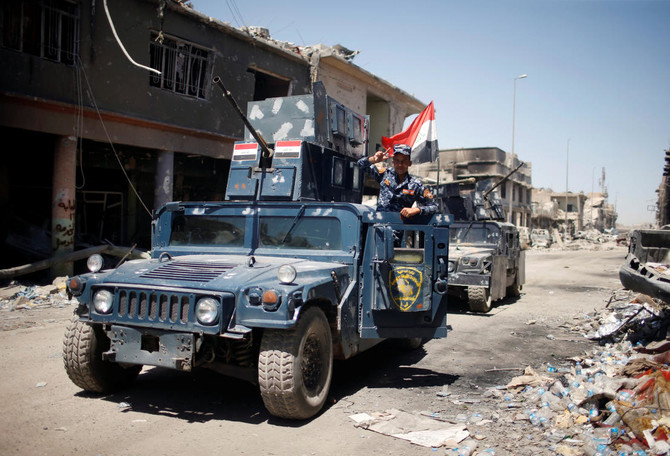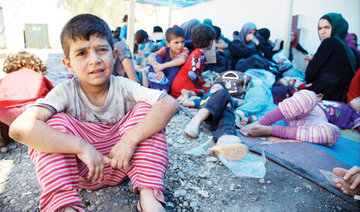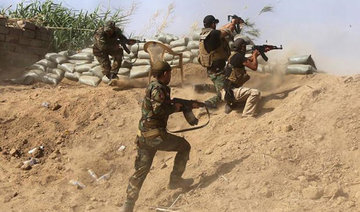BAGHDAD: The wires protruding from the small, misshapen stuffed animal revealed the deadly booby-trap tucked inside.
For the people of Mosul, the sophisticated bomb was a reminder of how difficult it will be to return to homes littered with hidden explosives by Daesh militants and dotted with the remnants of undetonated bombs dropped by the US-led coalition that still could blow up.
Washington at least is trying to ease a bit of the massive clean-up burden.
On Thursday, the top US commander in Iraq said for the first time that the American military will help contractors and other officials locate unexploded bombs dropped by the coalition. US Embassy officials have asked the coalition to declassify grid coordinates for bombs dropped in Iraq to help clear the explosives.
It may not be that simple, Gen. Stephen Townsend told a small group of reporters, “but we’ll find a way through that.”
“We’ll find a way to help them,” he said.
The coalition’s unexploded bombs are only a small part of Mosul’s problems. The bulk of the explosives have been hidden by Daesh fighters to be triggered by the slightest movement, even picking up a seemingly innocent child’s toy, lifting a vacuum cleaner, or opening an oven door. The effort could continue wreaking destruction on Iraq’s second largest city even as Daesh was defeated after a nine-month battle.
US Embassy officials and contractors hired to root out the hidden explosives use the same words to describe the devastation in western Mosul: Historic. Unprecedented. Exponentially worse than any other place.
“We use broad terms like historic because when you enter a dwelling, everything is suspect,” said the team leader in northern Iraq for Janus Global Operations, a contracting company hired to find and remove hidden explosive devices and unexploded bombs from Iraqi cities recaptured from the Daesh group. “You can’t take anything at face value.”
The team leader asked that he not be identified by name because he and his teams continue working in Mosul and the company fears for their safety.
Some estimates suggest it may take 25 years to clear West Mosul of explosives. The bomb-removing team leader said those understate what is sure to be a long, enduring problem.
Normalcy may return to parts of west Mosul in a year, and perhaps after a decade many of the obvious explosives will be found. But other unexploded bombs and hidden devices will surface at construction sites and other locations for years and likely decades to come, he said.
As much as 90 percent of west Mosul’s old city has been reduced to ruins, destroyed by the Daesh militants who occupied it for nearly three years and by the campaign of airstrikes and ground combat needed to retake the city.
For Muhammed Mustafa, a restaurant owner from west Mosul, the disaster is very personal.
“In the beginning we thanked God we had been liberated from our oppressor,” said Mustafa, 54, who had lived in Mosul’s old city.
Mustafa escaped Daesh territory as Iraqi forces pushed through western Mosul earlier this year and is now living with extended family in the city’s east.
“When my neighborhood was liberated, I wanted to return and gather some belongings. On my street all I saw was destruction, except my home, thank God, but I found a written statement on the wall warning it was bobby-trapped,” he told The Associated Press in a phone interview. “When I saw it, I couldn’t stand. I fell to the ground.”
Security forces in the area barred him from entering due to the risk.
“They said there were many houses like it and many people had already died trying to inspect their homes when a bomb inside exploded,” he said. “Can you imagine, the house I grew up in, now I can no longer enter?“
David Johnson, vice president for the Washington office of Janus Global Operations, said his workers are finding explosives where local residents would be most likely to trigger them, and are “seeing a level of sophistication and a number of improvised explosive devices that is literally without parallel.”
Over time, the officials said, the improvised explosive devices — or IEDs — have become far more innovative and sophisticated. They range from basic pressure plates in the roads or doorways to small devices, similar to ones that turn on a refrigerator light when the door is opened. They’re tucked into dresser drawers or smoke detectors, or buried under large piles of rubble that were pushed aside as Iraqi forces cleared roads to move through the city.
The devastation is so extensive and the danger so high that government and humanitarian agencies have been unable to get a full assessment of the explosives threat or a solid estimate of how much money and effort is needed to make the city safe and livable again.
The team leader painted a grim picture of the city where his workers have spent the last two weeks trying to clear explosives from critical infrastructure, including the electric grid.
A retired Navy explosives specialist who served multiple tours in Iraq and Syria, he said his team is “facing something we’ve never seen before.”
In the Navy, he said, his worst day involved finding 18 explosive devices. On Wednesday, on the outskirts of Mosul, his team cleared 50 explosive devices out of a pipeline. He estimated as many as 300 in that one area alone.
There are five such teams, totaling 130 people, working in Mosul. So far, no one has been injured. In Ramadi, however, company workers were killed and injured as they tried to eliminate explosives. Janus wouldn’t provide details.
Clearing Iraqi cities of explosives may take decades
Clearing Iraqi cities of explosives may take decades

Red Cross transfers 8 Palestinians from Israeli detention to Gaza

- They were taken across the Karm Abu Salem border crossing to Shuhada Al-Aqsa Hospital in Deir Al-Balah, where they were reunited with their families
LONDON: The International Committee of the Red Cross transferred eight Palestinians from Israeli detention to the Gaza Strip on Monday.
The organization took them across the Karm Abu Salem border crossing to Shuhada Al-Aqsa Hospital in Deir Al-Balah and helped reunite them with their families.
The Red Cross has been unable to visit Palestinian detainees in Israeli detention centers since October 2023, as a result of which the fate and location of many detainees from Gaza were unknown, the Palestinian Wafa news agency reported.
The Red Cross said that according to the principles of international humanitarian law, detainees must be treated humanely, held in proper conditions and allowed to have contact with their families.
Israel is holding about 9,245 Palestinian prisoners in jails, including 358 held without charge or trial under administrative detention, according to Jerusalem-based rights group HaMoked.













